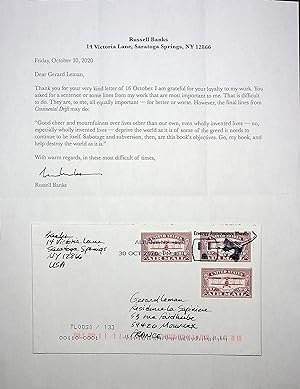Descripción
Russell BANKS (1940-2023) American writer of fiction and poetry Signed typed letter, signed by Russel Banks, 11 lines, to French autograph collector Gérard Léman + autograph envelope postmarked 30 OCT 2020 Russell Banks / 14 Victoria Lane, Sarasota Springs, NYY 12866. American writer of fiction and poetry, Russell Banks, member of the International Parliament of Writers and a member of the American Academy of Arts and Letters, thanks Gérard Léman, French autograph collector about his "kind letter" : "I am grateful for your loyalty to my work" and send him a quotation from his famous novel Continental Drift : "Good cheer and mournfulness over lives other than our own, even wholly invented lives no, especially wholly invented lives deprive the world as it is of some of the greed it needs to continue to be itself. Sabotage and subversion, then, are this book's objectives. Go, my book, and help destroy the world as it is." Continental Drift is a 1985 novel by Russell Banks. Set in the early 1980s, it follows two plots, through which Banks explores the relationship between apparently distant people drawn together in the world under globalization, which Banks compares to the geologic phenomenon of continental drift. The first plot features Bob DuBois, a working class New Englander who heads to Florida in the hopes of striking it rich; the second plot traces the journey of Vanise Dorsinville from Haiti to Florida. It is an avowedly political work, whose stated aim is to "destroy the world as it is." Despite its scope, it is according to critic Michiko Kakutani "somehow, acutely personal. The book sold well (15,000 copies in hard cover, 100,000 in paperback) and was highly acclaimed by critics. After publishing Continental Drift, Banks won the Dos Passos Prize for Literature in 1986. Russell Earl Banks was born in Newton, Massachusetts, on March 28, 1940, and grew up "in relative poverty." He is the son of Florence, a homemaker, and Earl Banks, a plumber, and was raised in Barnstead, New Hampshire. His father deserted the family when Banks was aged 12. While he was awarded a scholarship to attend Colgate University, he dropped out six weeks into university and travelled south instead, with the "intention of joining Fidel Castro's insurgent army in Cuba, but wound up working in a department store in Lakeland, Florida". He married Darlene Bennett, who was working as a sales clerk at the time; they had one daughter and later divorced. According to an interview with The Independent, he started to write when he was living in Miami in the late-1950s, though an interview with The Paris Review dates this to Banks's subsequent spell living in Boston. He moved back to New England in 1964 and then to North Carolina, where he attended the University of North Carolina at Chapel Hill, funded by the family of his second wife, Mary Gunst. In Chapel Hill, Banks was involved in Students for a Democratic Society and protest during the Civil Rights Movement. In 1976, he was awarded a Guggenheim Fellowship. Banks divorced Mary Gunst in 1977 after 14 years of marriage. They had three daughters. He was subsequently married to Kathy Walton, an editor at Harper & Row, from 1982 to 1988. The following year, he married poet Chase Twichell. Banks was the 1985 recipient of the John Dos Passos Prize for fiction. Continental Drift and Cloudsplitter were finalists for the 1986 and 1999 Pulitzer Prize for Fiction respectively. Banks was elected a Fellow of the American Academy of Arts and Sciences in 1996. In popular culture, Banks was briefly mentioned in philosopher Richard Rorty's 1996 future history essay "Fraternity Reigns" in The New York Times Magazine as having written the fictional book Trampling the Vineyards, described as "samizdat", in 2021. Banks lived in upstate New York and Miami. He was a New York State Author for 2004 2006. He was also Artist-in-Residence at the University of Maryland. He taught creative writing at Princeton Univers. N° de ref. del artículo ABE-1704953270390
Contactar al vendedor
Denunciar este artículo
![]()
